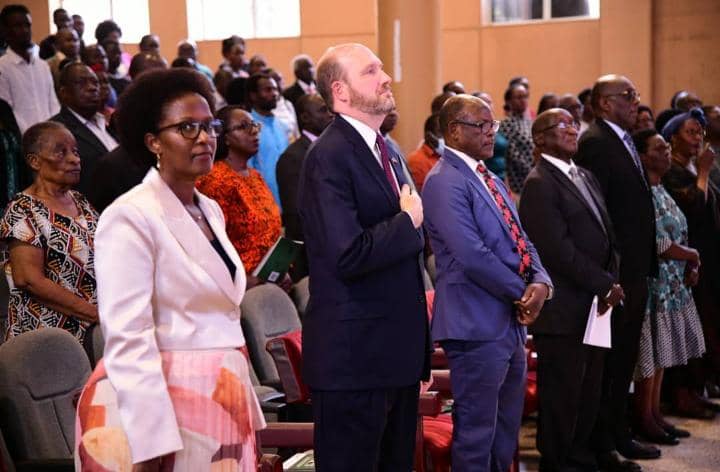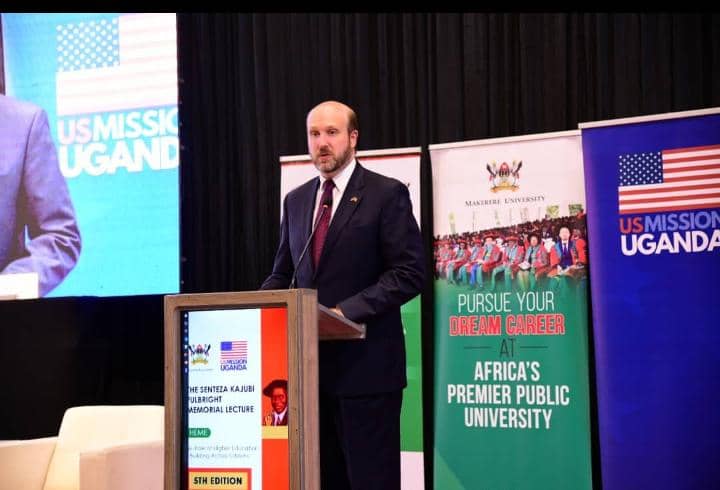By Julius Mugaga Tukacungurwa/Umoja Standard.
Kampala, Uganda: H.E William W Popp, the US Ambassador to Uganda, recently highlighted the crucial role of higher education in fostering active citizenship and promoting democracy and the significance of international education and collaboration.

He made these remarks during ‘The Senteza Kajubi Fulbright Memorial Lecture’ at Makerere University that ran under theme ‘The Role of Higher Education in Building Active Citizens’
“The International Day of Democracy reminds us of the value of freedom and the importance of citizen engagement in supporting democracy,” Ambassador Popp noted. With over half of the world’s countries holding elections this year, the ambassador stressed the need for universities to provide leadership opportunities for students.
“In Uganda, student guilds serve as platforms for democratic governance, while in the US, student councils offer valuable experiences in leadership, voting, and advocacy. Judy Heumann’s advocacy for disability rights and the 1960s civil rights movement as examples of student activism driving social change.” He noted.
Universities also play a vital role in addressing societal challenges through research and innovation. The launch of the Center for the Study of the United States at Makerere University’s Political Science Department exemplifies the partnership between the US and Uganda in higher education.
Ambassador Popp emphasized the mutual respect, shared values, and collaborative endeavors that underpin this partnership. “Those who have benefited from education have a responsibility to give back to their communities and contribute to the common good,” he urged.
The ambassador encouraged participants to share their education and experiences, enabling the next generation to engage thoughtfully and responsibly in society. By fostering active citizenship and promoting democracy, universities can shape the future of global leadership.
Makerere University Council Chairperson, Ronah Magara, hailed Prof. Senteza Kajubi’s legacy. She thanked Ambassador William Pop for his keynote address, praising his insights on civic engagement and leadership.
She reflected on her own educational background, highlighting the importance of experiential learning, ethical development, and institutional support. She outlined three broad categories of education; knowledge acquisition, Understanding through application, Values and soft skills
Magara commended Makerere’s research-led agenda, citing the innovation hub’s $1 million investment from UNDP. She encouraged students to seek mentorship, networking, and hands-on experience.
“We must shift from ‘what can I receive?’ to ‘what can I give back?'” Magara urged. “Critical thinking starts now, not in the work world.”
She expressed gratitude to the US Mission for their long-standing partnership, particularly through Fulbright scholarships and research funding.
Magara honored Prof. Kajubi’s legacy, reaffirming Makerere’s commitment to social progress and citizen empowerment. “Let us draw inspiration from his legacy and work together to achieve great things.”
Prof. Barnabas Nawangwe, the Vice Chancellor Makerere University honored the legacy of Prof. Senteza Kajubi, Uganda’s first Fulbright scholar, at the memorial lecture. He shared personal anecdotes, highlighting Prof. Kajubi’s impact on his own career and Uganda’s education.
“Prof. Kajubi was a giant in Uganda’s education history, serving twice as vice chancellor and chairing education commissions,” Prof. Nawangwe said. “As the first African Fulbright scholar in the US, he paved the way for Africans to study abroad.”
He cited Makerere University’s partnerships with US institutions, including MIT and Harvard, as a direct result of Prof. Kajubi’s pioneering work.
Prof. Nawangwe concluded, “We owe a debt of gratitude to Prof. Kajubi for his trailblazing contributions to higher education and Uganda’s development.”
Prof. Anthony Muwaga Mugagga, Principal of Makerere University’s College of Education and External Studies, sounded an alarm on academic equality during the Senteza Kajubi Fulbright Memorial Lecture.
He reminisced about a pivotal 1969 gathering at Makerere University, where academicians engaged in fruitful discussions, and wondered what’s gone wrong since then.
Mugagga stressed that teacher training is crucial for promoting science and technology, yet schools of education receive significantly less funding than fields like engineering and medicine.
“This disparity threatens Uganda’s progress in education, despite efforts to promote gender equality and girl child education. Uganda aims to achieve gender parity by 2030, but Mugagga’s concerns highlight the need for balanced investment in education” He noted.


